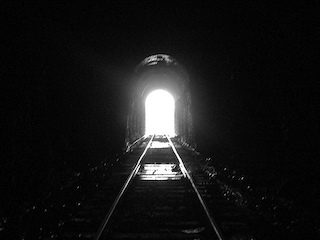Mar 18th, 2015 - Category: Strategy
Or is it a train? A bit dramatic, but drama seems to be everywhere in the wireless industry these days. With T-Mobile’s extremely successful “uncarrier” programs (roll over data, etc.), Sprint clawing their way back into the game, and AT&T / Verizon’s arrogance (and high prices), it is a soap opera of epic proportions.
 Recently, Rootmetrics published a report, “2nd Half 2014 US Mobile Network Performance Review” that got a lot of attention because it showed T-Mobile’s coverage and reliability lagging behind every other carrier, even Sprint. This was suspicious because I travel quite a bit and this is not my experience with T-Mobile. Sure, outside major cities, T-Mobile’s coverage lags behind AT&T and Verizon, but generally it is quite good and very fast. SlashGear responded with an article the same day, “Sprint just beat T-Mobile everywhere it doesn’t matter” which provided another perspective on the Rootmetrics report showing that T-Mobile is focusing on high speed data, coverage in cities, and sensible pricing which is giving the other carriers a real run for their money. For millennials, voice calls are uncommon and typically used for emergencies / talking to parents: the availability of high speed data is the true differentiator.
Recently, Rootmetrics published a report, “2nd Half 2014 US Mobile Network Performance Review” that got a lot of attention because it showed T-Mobile’s coverage and reliability lagging behind every other carrier, even Sprint. This was suspicious because I travel quite a bit and this is not my experience with T-Mobile. Sure, outside major cities, T-Mobile’s coverage lags behind AT&T and Verizon, but generally it is quite good and very fast. SlashGear responded with an article the same day, “Sprint just beat T-Mobile everywhere it doesn’t matter” which provided another perspective on the Rootmetrics report showing that T-Mobile is focusing on high speed data, coverage in cities, and sensible pricing which is giving the other carriers a real run for their money. For millennials, voice calls are uncommon and typically used for emergencies / talking to parents: the availability of high speed data is the true differentiator.
So maybe AT&T / Verizon are thinking they are seeing the light at the end of the tunnel and can relax. They are even publicly saying they don’t need to compete for customers anymore, “AT&T comments may indicate a lull in deals for mobile plans” and CNET’s “AT&T says it won’t chase after customers as price wars ease.” However, the history of the wireless industry has regularly shown otherwise: remember Blackberry, Nokia, and even Palm Treos?
 Oh, how the mighty have fallen. A little more thought brought up several more companies that were household words a few years ago: TiVo, AOL, Yahoo, Pets.com, Geocities, Sony (they are doing their best to quicken their demise), MySpace, Gateway, Iridium, Atari, RealNetworks, etc., all companies that dominated their markets, but are now shadows of their former selves. When clients are resistant to change, it is easy to find several examples to illustrate the results of avoiding it. The fall might take longer in niche markets, but it still happens regularly. Even more concerning, it can happen as a result of just a few bad managers in positions of power. A failed new product development or redesign has ended many small companies.
Oh, how the mighty have fallen. A little more thought brought up several more companies that were household words a few years ago: TiVo, AOL, Yahoo, Pets.com, Geocities, Sony (they are doing their best to quicken their demise), MySpace, Gateway, Iridium, Atari, RealNetworks, etc., all companies that dominated their markets, but are now shadows of their former selves. When clients are resistant to change, it is easy to find several examples to illustrate the results of avoiding it. The fall might take longer in niche markets, but it still happens regularly. Even more concerning, it can happen as a result of just a few bad managers in positions of power. A failed new product development or redesign has ended many small companies.
This said, it would be good to end on a positive note. Google image search seems to have a sense of humor these days. Here is another image from my search for ”the light at the end of the tunnel.” Who comes up with this stuff?!